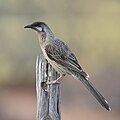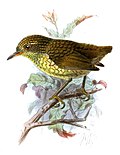Anthochaera
| Anthochaera | |
|---|---|

| |
| Red wattlebird (Anthochaera carunculata) | |
| Scientific classification | |
| Domain: | Eukaryota |
| Kingdom: | Animalia |
| Phylum: | Chordata |
| Class: | Aves |
| Order: | Passeriformes |
| Family: | Meliphagidae |
| Genus: | Anthochaera Vigors & Horsfield, 1827 |
| Type species | |
| Anthochaera carunculatus[1] Vigors & Horsfield, 1827
| |
| Species | |
|
See text | |
Anthochaera is a genus of birds in the honeyeater family. The species are endemic to Australia and include the little wattlebird, the red wattlebird, the western wattlebird, and the yellow wattlebird. A molecular phylogenetic study has shown that the regent honeyeater also belongs in this genus.
Description
[edit]Of the five species in the genus only the yellow wattlebird (Anthochaera paradoxa) and the red wattlebird (A. carunculata) have the wattles of their common name.[2] These are bare fleshy appendages, usually wrinkled and often brightly coloured, hanging from the cheeks, neck or throat, and presumably serving for display.
A common name for species of the genus is wattlebird, a term also used for unrelated avian species.
Taxonomy
[edit]The genus Anthochaera was introduced in 1827 by the naturalists Nicholas Aylward Vigors and Thomas Horsfield.[3] The name is derived from the Greek anthos meaning flower or bloom and khairō meaning to enjoy.[4] The type species was designated as the little wattlebird by the German ornithologist Hans Friedrich Gadow in 1884.[5][6]
The regent honeyeater (Anthochaera phrygia) was formerly placed in its own genus, Xanthomyza, but placed with the Anthochaera genus in a 2004 molecular phylogenetic study.[7][8] The genus Anthochaera is sister group to the species Acanthagenys rufogularis, the spiny-cheeked honeyeater, separated as a monotypic genus.[9]
| ||||||||||||||||||||||||||||||||||||
| Cladogram showing the relationship between species.[9] |
Species and distribution
[edit]The genus Anthochaera contains the following species:[8]
| Image | Common name | Scientific name | Distribution |
|---|---|---|---|
 |
Red wattlebird | Anthochaera carunculata | southeast Queensland, New South Wales, Victoria, South Australia and southwest Western Australia |
 |
Little wattlebird | Anthochaera chrysoptera | coastal and sub-coastal south-eastern Australia |
 |
Yellow wattlebird | Anthochaera paradoxa | Tasmania |
 |
Western wattlebird | Anthochaera lunulata | south-western Australia. |
 |
Regent honeyeater | Anthochaera phrygia | south-eastern Australia |
See also
[edit]References
[edit]- ^ "Melaphagidae". aviansystematics.org. The Trust for Avian Systematics. Retrieved 2023-07-16.
- ^ Higgins, P.; Christidis, L.; Ford, H.; Bonan, A. (2008). "Honeyeaters (Meliphagidae)". In del Hoyo, J.; Elliott, A.; Sargatal, J.; Christie, D.A.; de Juana, E. (eds.). Handbook of the Birds of the World Alive. Lynx Edicions. doi:10.2173/bow.meliph3.01. S2CID 241635246. Retrieved 23 January 2017.
- ^ Vigors, N.A.; Horsfield, T. (1826). "A description of the Australian birds in the collection of the Linnean Society; with an attempt at arranging them according to their natural affinities (Part 1)". Transactions of the Linnean Society of London. 15 (1): 170–331 [320–321]. doi:10.1111/j.1095-8339.1826.tb00115.x. The title page gives the year as 1826 but the issue was not published until 1827.
- ^ Jobling, J.A. (2010). The Helm Dictionary of Scientific Bird Names. London: Christopher Helm. p. 49. ISBN 978-1-4081-2501-4.
- ^ Gadow, Hans (1884). Catalogue of the Passeriformes or Perching Birds in the Collection of the British Museum. Catalogue of the Birds in the British Museum. Vol. 9 Cinnyrimorphae: containing the families Nectariniidae and Meliphagidae (Sun-birds and Honey-eaters). London: Trustees of the British Museum. p. 262.
- ^ Salomonsen, F. (1967). "Family Maliphagidae, Honeyeaters". In Paynter, R.A. Jnr. (ed.). Check-list of birds of the world (Volume 12). Vol. 12. Cambridge, Mass.: Museum of Comparative Zoology. pp. 338–450 [444–445].
- ^ Driskell, A.C.; Christidis, L. (2004). "Phylogeny and evolution of the Australo-Papuan honeyeaters (Passeriformes, Meliphagidae)". Molecular Phylogenetics and Evolution. 31 (3): 943–960. Bibcode:2004MolPE..31..943D. doi:10.1016/j.ympev.2003.10.017. PMID 15120392.
- ^ a b Gill, Frank; Donsker, David (eds.). "Honeyeaters". World Bird List Version 5.4. International Ornithologists' Union. Retrieved 26 December 2015.
- ^ a b Marki, P.Z.; Jønsson, K.A.; Irestedt, M.; Nguyen, J.M.; Rahbek, C.; Fjeldså, C. (2017). "Supermatrix phylogeny and biogeography of the Australasian Meliphagides radiation (Aves: Passeriformes)". Molecular Phylogenetics and Evolution. 107: 516–529. Bibcode:2017MolPE.107..516M. doi:10.1016/j.ympev.2016.12.021. hdl:10852/65203. PMID 28017855.
External links
[edit]- Wattlebird videos on the Internet Bird Collection

